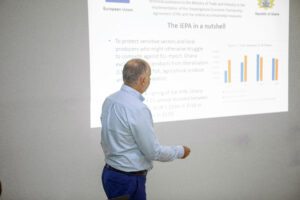Mr Nicolas Gebara, Team Leader of Compete Ghana, has said the Economic Partnership Agreement (EPA) between the European Union (EU) and Ghana reduces trade barriers between the two entities and this enhancesGhanaian exporters’ opportunities for export to the EU
He said among the Agreement allows Ghanaian companies to enjoy access to EU markets “duty free, quota free”.
“But there are also some requirements that every exporter must comply with, such as EU quality standards and norms, rules of origin and certifications,
In the process of implementing the EPA, a number of public stakeholders are play a key role in guiding the private sector in their efforts to export to the EU. Therefore the Compete Ghana Programme has embarked on building the capacity of public institutions and assessed the needs of individual institutions to be involved in the effective implementation of the EPA.

Following individual consultations with public institutions, The Compete Ghana programme organised avalidation workshop in Accra to discuss training public institutions on key areas of the EPA in Accra,
Mr Gebara said the EPA secretariat at the Ministry of Trade and Industry are monitoring the processes required in implementing the EPA, and that there were joint committee meetings between Ghana and EU to discuss the progress so far.
He said the EU was financing the capacity enhancement of government institutions that were directly and indirectly related to the implementation of the EPA.
“Every institution has a role to play in guiding the private sector on how to enhance their exports to the EU market, and so we have identified and invited thirteen institutions to know the level of skills they will require to implement the agreement efficiently,” Mr Gebara stressed.
Mrs Justina Mensah, a capacity building expert, said it was very important that the Minisgtry of Trade and Industry and the EU support and make the necessary arrangements to facilitate access to the priority resources identified in the capacity needs assessment of the thirteen institutions.

She said the thirteen public institutions should also use innovative approaches to support the capacity development process of their institutions.
Mr Raffaele Quarto, Trade Counselor, EU Delegation, said they were implementing the project to develop the capacity and skills of Ghanaian businesses and authorities to be able to benefit fully from the agreement.
He indicated that the delegation was implementing other programmes on vocational training, agriculture, and other areas not related to business.
The Compete Ghana Programme is in the context of the Ghana beyond aid vision, to improve economic governance and the business environment, and to maximise the benefits of the EPA for Ghana.

It also would strengthen the competitiveness of Ghana’s exports and enhance Ghana’s integration into the regional and international trading system.
Following the validation workshop and the active feedback provided by the participants, the Compete Ghana Programme will be organising over the next months, training sessions on key areas of the iEPA to strengthen the capacity of the selected public institutions to support exporters, manufacturers and farmers in increasing production and meeting standards and quality










